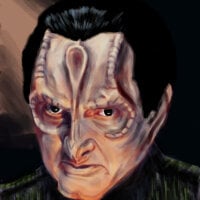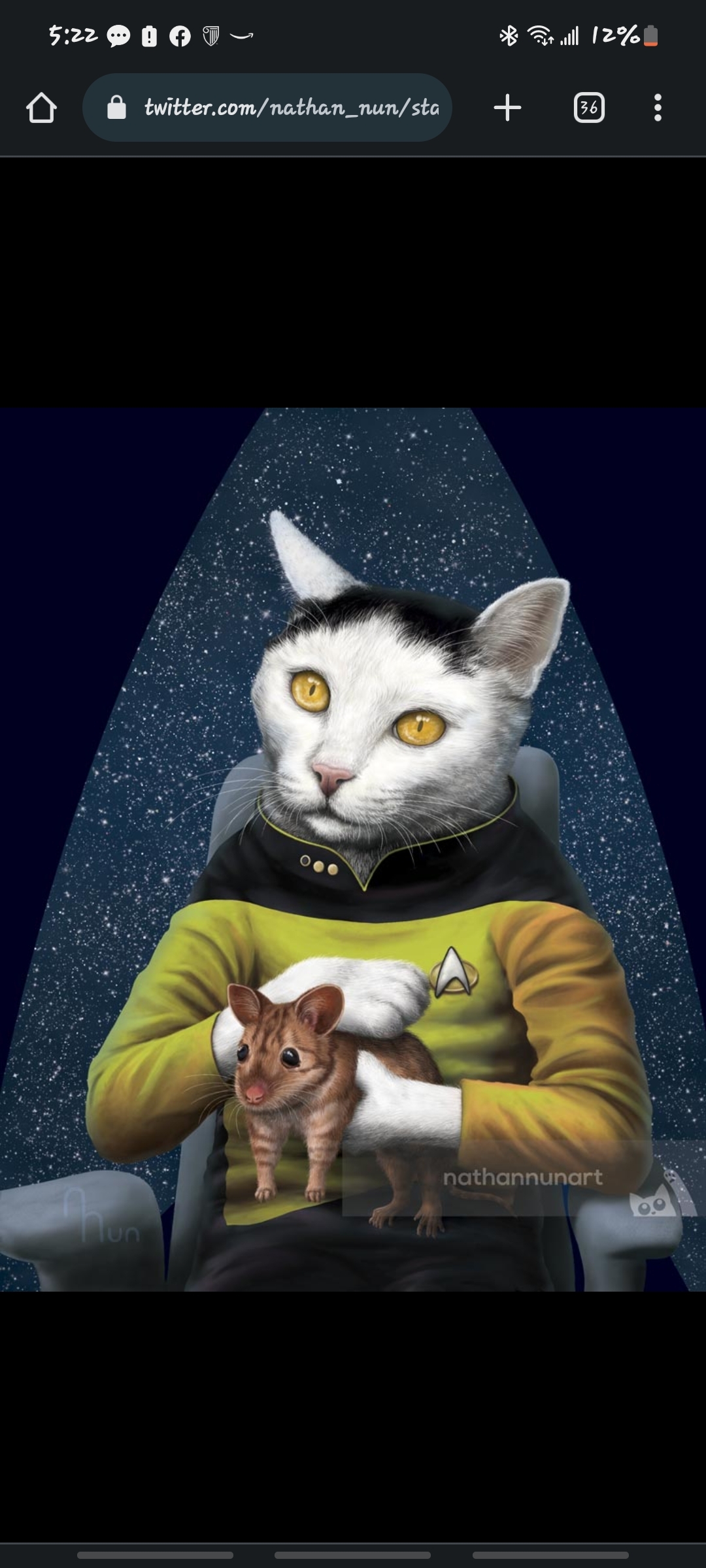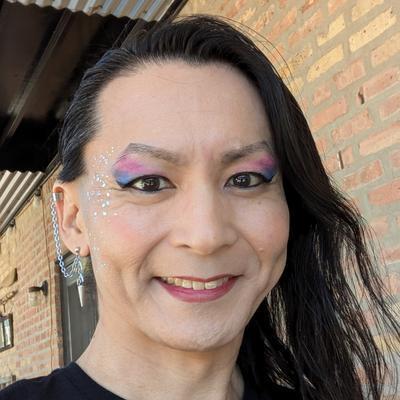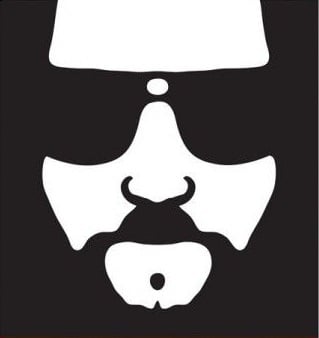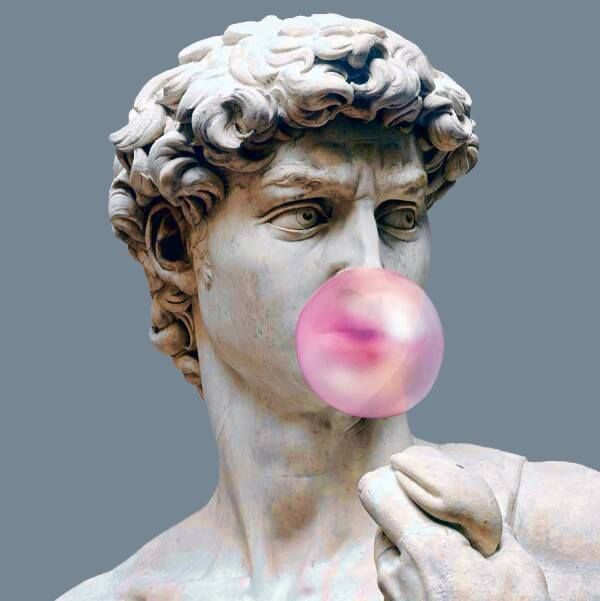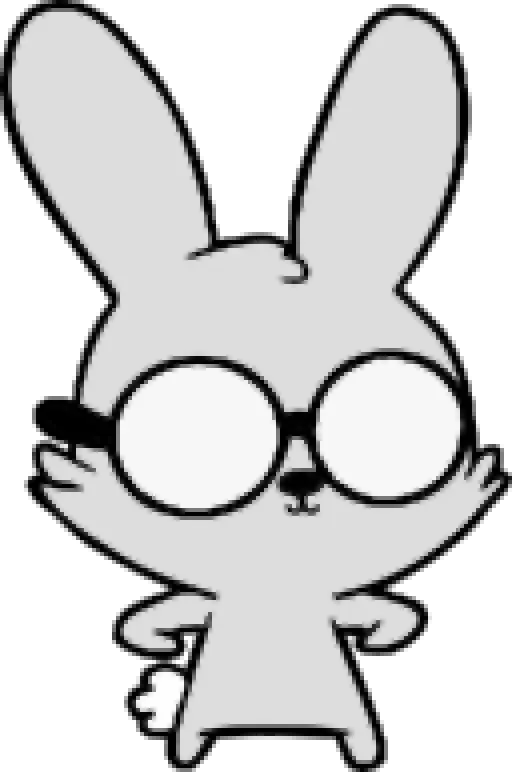Klingons are amazing. Another example:

I also really appreciated Worf and Martok’s take on Garak’s struggles with claustrophobia
Martok: There is no greater enemy than one’s own fears.
Worf: It takes a brave man to face them.
Can we just give a hand to the who ST team who whiplashed Klingons from a poorly defined eternal enemy into one of the greatest examples of non-toxic masculinity representation on tv.
Honestly I really think this show is the reason I turned out more compassionate than my parents.
Our gods are dead. Ancient Klingon warriors slew them a millennia ago. They were… more trouble than they were worth.
Maybe just one of the many reasons Klingon’s often seem ridiculously awesome. When you reject ancient gods because they were “troublesome” you’re choosing to build a world where the world having no meaning becomes liberating instead of suffocating.
No wonder things like this are so easy for them to understand. No religious baggage!
I like to think of that stance as “positive nihilism” if that makes sense. It is liberating to really feel in your bones that it’s OK to focus on one things that really matter to you rather than the things you’ve been taught should matter to you.
Was it ever made canon that the old Klingon “gods” were a spacefaring race that conquered the still plabet-bound Klingons with superior technology and were eventually overthrown? I feel like that might have been beta canon, or maybe just a very compelling fan theory.
NOOO BUT SHE ISN’T TRANS SHE’S A TRILL WHICH IS DIFFERENT BECAUSE IT’S STILL DAX JUST FROM…
- Real people who don’t understand symbolism.
I don’t think the writers intended the Trill to be a an allegory for being trans. It was probably just supposed to be a cool sci fi stand in for being different. You can only show current, real life discrimination being non existent in the Federation in so many ways before you have to make up new things.
But it also doesn’t change anything. Trans allegory or not, it’s yet another instance showing how Star Fleet and the Federation value everybody, no matter if they’re different or how they’re different. Fuck the transphobes.
There’s that DS9 episode where Jadzia risks exile from Trill society to revisit an old relationship, and, if not necessarily trans, it reads pretty obviously as a queer allegory.
I still wouldn’t say that one reads as a trans allegory. The conflict arises from failing to meet social expectations, not from changes in gender.
But yeah, it definitely reads as a queer allegory.
Oh, queer, sure. Star Trek has had plenty of queer relationships; she wasn’t the first. Trans is a whole different thing, though; queer is who you’re attracted to; trans is a self-identity topic. Trans says nothing about who you’re attracted to; you can be a gay trans person, a hetero trans person, a bi or asexual trans person. Trans(sexual) is about what plumbing you feel you should have, not whether you’re hetero or homo.
What episode?
I think they are talking about “Rejoined” s4e5? https://m.imdb.com/title/tt0708588/?ref_=tt_mv_close
That’s the episode. It got a fair bit of press when it aired due to the “lesbian kiss”, which probably sounds ridiculous now, but that was like…wow, literally two generations ago. It was a wild time, it was just a year earlier that the U.S. military released its official policy on sexual orientation, which basically amounted to pretending that nobody is gay. On a personal note, I remember crying like a baby at the end of this episode when I first saw it and not understanding why it affected me so deeply. And holy crap, I’m now realizing it was my subconscious screaming “That’s you, dummy!!”
That’s how I feel, but I don’t think it takes away from people who see the situation as similar to being trans.
And also, just in general, it’s so easy to treat trans people with respect. It’s very easy, and if you do make a mistake on their pronouns or accidentally deadname someone, I’ve never ever had them take it offensively, just apologize and we move on.
That’s how I feel, but I don’t think it takes away from people who see the situation as similar to being trans.
I was speaking more about the intention of the writers at the time they made the character. Seeing it as an allegory for being trans is still 100% valid despite it probably not being the intentions of the writers.
I edited my comment to make that more clear.
And also, just in general, it’s so easy to treat trans people with respect. It’s very easy, and if you do make a mistake on their pronouns or accidentally deadname someone, I’ve never ever had them take it offensively, just apologize and we move on.
Agreed
I think I read that the way you intended with your clarification, and it makes sense and I agree with you
I don’t even think it’s symbolism from the Klingon’s perspective. It’s a bit different with the Trill extra personality there, but the objection is the actual point. That’s still Dax in there, even though they look different now.
Sisko still calls her Old Man though. Somewhat ironically, but consistently.
Yeah, but less in a pronoun sense and more in a nickname. She never asked him to stop, if she did I’m guessing he would have stopped immediately
A term of endearment they share, not seen as an insult, and all the more silly that the Dax symbiote is now hosted by a body younger than Sisko. It works well.
It’s an honor to be given a nickname by The Sisko.
He calls Mirror O’Brian “Smiley”, and that’s also considered a term of endearment even though it was used as an insult by Mirror Sisko.
And he calls Picard “Wife-killer”, which Picard has never verbally objected to. :)
Its not symbolism.
The reason people view Dax as a trans is that they were at times male and at times female. That is not symbolic of being trans, it is just being trans.
However, despite exploring what it means to be a trill passing through generations of hosts, the changing gender aspect of it never comes up. If Kurzon was a women, I doubt we would be talking about Dax as a trans stand-in, but I can’t think of a single plot point or character development that would meaningfully change.
Normally I’m a believer in death of the author, so I won’t be offended if anyone wants to completly ignore thus section, but in the DS9 documentary, they have a section on LGBT representation, and their big example for it was Jadzia. However, that was not for being trans, it was for being in a gay relationship.
Dax is the “soul”, Jadzia or Curzon are the bodies. Thus it seems that the gender of Jadzia Dax / Curzon Dax is entirely defined (or perhaps not defined at all?) by the body Dax is residing in. Whereas trans people in real world believe in a gendered soul that is independent of the body they are in… right?
But it’s not like I oppose some other interpretation of it.
Do the symbiots even have genders? How do they reproduce?
The first name comes from the host; the second name is the symbiot. Like, Jadzia was “Jadzia” before being joined, and was still called “Jadzia” after; she was just “Jadzia Dax” after joining. Curzon was the male host.
Do you think the Trill were a metaphor for trans people? Really? Given the symbiot factor, it seems a stretch.
It’s meant to be a stretch. Star trek has always done sci-fi twists on modern day problems. It’s meant to be “Why is it not weird for this sci-fi thing to happen, but weird when it happens in our every day life.”
Terry Farrell also knew full well when she joined that she would be playing a non-binary role through the show, and did so proudly. They also pretty much call it out directly in “Rejoined” when Dax comes in contact with her previous lover.
Because their masculinity and confidence in themselves is so impeccable that nothing that anyone any where can say or state about any other sexuality will ever effect them.
They are so comfortable and sure in who they are that nothing they ever see, no matter how different, will ever affect them.
To me, someone who accepts everyone else while maintaining their own surety on themselves is the height of masculinity.
“Waste no more time arguing what a good man should be. Be one.” – Marcus Aurelius
Edit: extrapolated for modernity, rephrase as “good person”
To me, someone who accepts everyone else while maintaining their own surety on themselves is the height of masculinity.
I’m sorry, but are you saying feminine people cannot also do this? Or that it would make them masculine?
What would you say was a positive feminine trait?
All i can think of is the nurturing and protective instinct of mothers that society lionizes, but those apply to men too so i don’t really see them as feminine.
It seems like you see the problem too. I hope you’re able to give the above commenter a break, due to that.
All i did was ask a question, and you have shed no light on that at all. I don’t know what problem you refer to or how your comments relate to what op said. Maybe I’m a moron… I give up.
As did I. So, I’m not sure how you could have a problem with someone else doing the same. Yet here you are.
Either there are no inherently masculine and feminine virtues or the best we have are social constructs that fall short of what we want and picking at people for attempting to present a positive version of masculinity that isn’t just fighting or dominating isn’t helping anyone.
As did I. So, I’m not sure how you could have a problem with someone else doing the same. Yet here you are.
I answered your question and i did not accuse you of picking at me or ask you to give me a break. I am merely frustrated that my initial question has not been answered and you have been a bit cryptic.
So I’ll ask it again in a different way: if i am a woman who is comfortable with themself and unconcerned with other peoples sexualities, does that make me manly? Is this a difficult question? Am i weird if my answer is no? Why is asking this question seen as an attack on positive masculinity?
Honestly, I’ve gained a whole new level of appreciation for Jadzia’s character in recent years, largely in light of how absurdly politicized gender identity and trans rights have become.
I’ve spent too much time on computers.
I don’t see people as their age, gender, color, name, whatever. To me, a person is a construct, that construct is immutable. You, as a person, exist, only your variables change. Your name, age, gender, sex, personality, political views, culture, race, skin color, etc, are all properties of the immutable object that represents you.
In this way, your name, gender, age, political views, etc, can all change, and the human object that is you, never changes.
Technology does this already. A good example is with user accounts for something like active directory (the windows domain login thing). Your user object isn’t assigned by name, or login ID or whatever. You have, what is referred to as a UUID inside of the system. To that UUID, you have parameters like your name, email, phone number, etc, attached to it. When permissions are given, they’re given to your UUID, not to your name.
Because of this, the administrators like me, can update your name, phone number, login, email, etc, without changing what you have access to. Your email account is tied to your UUID as well, so your user object has permission to access that mailbox, and it’s listed in the parameters as your primary mailbox (for stuff like auto configure).
It’s all very basic object oriented stuff.
wait, you literally objectify people
OOP does an outstanding job of illustrating the nature of the universe, and people are part of that universe.
Fair enough.
Wait wait wait… immutable means unchangeable! In your analogy this would mean if someone changes anything about them, like a name due to marriage or gender due to affirming care, they become a new object. And you can, but shouldn’t assign that new object the same UUID.
Welcome to the wonderful, confusing world of objects, semantic models and unintuitive terminology.
The “immutable object” is an abstract kernel of your being, to which all other properties are related. It represents, in a way, the coincidence of all those other properties, but it’s not quite so simple.
In semantic modelling, those properties are considered objects too, albeit often dependent ones: “Hair color” in the sense of a person’s hair color is an object type; individual instances cannot exist without a person whose hair they’re describing. “Blonde”, in that sense, is a grouping of instances, but if there were no blonde people, the group would be empty.
Likewise, “Name” is an object type that depends on the thing it’s naming. Sure, you can come up with arbitrary terms that don’t refer to anything, but they’re semantically meaningless. Conversely, a thing can exist without being named, like a newborn. You could identify it as “the newborn baby of <parents>”, but that isn’t a name so much as list of properties (newborn, parents\¹), that coincide for one particular person.
The combination of a simple object (that a stract kernel) and its dependent objects (properties) forms a complex object. You, as a person, probably have a name by now. You also probably have a body, a past², some knowledge and skills like the ability to understand and form words and sentences, which in turn includes a vocabulary…
If you change your name, that is one property that changes; one dependent object that is swapped out for another. The rest of your properties is unaffected by that. Formally, the relation between you and your name is mutable, but your eye color for instance (probably) isn’t dependent on your name.
Now, if you were to somehow swap out all dependent objects at once, changing every property - a different name, different past, different parents, different body - then you would arguably be a different person. Even if you could argue that the core object remains the same, but given that this core object is an abstraction to describe the complex of properties and relations, which no longer has any intersection with the original, that “sameness” is effectively meaningless. The original configuration of properties is no longer tied to anything.
The philosophical difficulty of this concept is the question just what level of change constitutes a different object; which properties are immutably tied to you, so that changing one of them would be a different person? It’s the Ship Of Theseus question: How much about a thing can change before it’s no longer the same?
Do we argue that, as soon as even one property is changed, it no longer is the same object? Then every moment in time, adding to the past of an object, will make it a new object, nothing is permanent and the immutability is worthless.
For a person, most immutable properties of yours would be part of your past - where you were born, when you were born, essentially the continuous sequence of moments in your existence leading up to this one. The name you were assigned after birth would be a part of that history, even if the name you now use is a different one. Yet we do say that someone has become a different person if things like worldview and patterns of behaviour differ strongly enough. Again we encounter the question: What else, besides your past, defines you?
Practically, most contexts use some subset of your properties to define a person. In the example of a user id, that is the one immutable identification for user management purposes. Change the name, age, login, permissions and everything - from the system’s perspective it’s still the same user. Semantically, this might be a different person, but the system doesn’t care.
Practice has to make concessions to the limitations of human abilities. We accept a level of ambiguity by ignoring some properties, because ultimately every model and pattern is supposed to simplify our decision-making. Overcomplicating things doesn’t help us navigate life.
1 Parenthood itself could be modeled a simple, abstract object, dependent on both the parent and the progeny, representing the circumstance that one is the parent of the other. Technically, the Child could then exist independently from having parents; Practically, biology gets in the way of that.
2 Modeling the past of a given object is actually a complex exercise that also runs up against many of the same problems: You could consider it a continuous set of moments, each of which represents a relationship between a point in time and your exact state (coincidence of properties) at that point. But under the assumption of linear time, each moment would describe a different state, at the very least a different set of past moments.
I would just argue that objects of the Person-type are mutable, because basically everything about them can change without modifying who they are. The only thing immutable about a person is any one Moment-type object in their past.
Edit: I found your comment to be an interesting take on the concept, thank you!
I had to read up on the topic of semantic models for my Bachelor’s thesis - this just might be the first time I’ve actually gotten to talk about it since my thesis defense.
I think this is fairly well explained by others, but the root object is immutable. That would be the human object that represents a unique person. The properties/parameters applied to that object are entirely mutable.
Even after death, your person object still exists, it’s just given the property of being disabled/dead (and/or, the “living” property is removed).
Not quite. Picture an immutable map in your programming language of choice (something like const map). You cannot reassign the map object to a new one, but you totally can change its keys and values.
I get what youre saying but this is still only kind of true for languages that only the variable assignment is constant (like javascript) rather than the value itself (like rust). If I create a map in rust, without any modifiers, that map is immutable and can’t be changed (not even the contained values). If I create a map in JavaScript using the const keyword, I have created a constant in that block that cannot be reassigned, but any values within the map are changeable like you mentioned. It means the object itself is mutable, but it belongs to a variable that is not.
-
questions about identity are so damn interesting. Like what exactly is being referenced when we say “Sarah” or “Coco-Cola” or “Spain”?
-
I’m gonna be pissed if I find out my soul is just some 16 trillion digit hex number.
-
I think if humans had visible UUIDs they would still only account for a part of our understanding of a person’s identity. If you could make utterly perfect copies of people like you can with objects and they only differed by their UUID…how different would those two people be really? How many people for example would be happy to replace a dead loved one with such a copy?
Disregarding everything else you mentioned, I’m also extremely curious what exactly is being referenced when you say “Coco-Cola”?
(I realize it’s just a typo, but the idea caught me off guard cause it sounds gross)
If you could make utterly perfect copies of people like you can with objects and they only differed by their UUID…how different would those two people be really
This made me think of identical twins. Perfect copies, but the minute they are born (for the convenience of tracking experience) they begin to differ. The majority of their properties and attributes remain identical, but their associations and metadata start to change.
Identical twins provide an interesting thought experiment because a lot of times they end up with the same job roles, married to similar people (or even other sets of twins), dress similarly, have similar attitudes and opinions, etc. But in many ways they are just the same genetic code running in a different environment.
If souls are just uuids, then I guess twins are some type of hash collision?
Interestingly, most countries have a rudimentary system for giving people identifiers. Like a SSN.
-
deleted by creator
wait, so if someone tells you to refer to them in a different way, you can just go “ok” and move on without the smallest hitch in your life? without losing your shit and foaming at the mouth?
nah… no way.
are we sure this particular Klingon didn’t start a podcast later to cry about this for months?
If not a podcast, then at least a video shot in portrait mode, alone in the cockpit of a shuttle craft because the rest of their house can’t stand listening to their crap.
It’s easy for us but those that hold bigotry as part of their identity will have problems.
What you identify as does not matter, as long as you die in battle with honor!
Do they have no joy!?
Show your joy!
Kaplah!
Hab SoSlI’ Quch! >>>:(
nuqjatlh
Mère front lisse
ghewmeyvam’e’ wISovbe’. tlhIngan maH!
Wow, I saw that episode, for the first time, like an hour ago.
Oh wow. You have so much more wonderful DS9 ahead of you still!
I hope so!
Though unlike 99.99% of the rest of you, pretty sure when I hit the dominion and changeling stuff I’m going to nope out. I have some vague recollection of bits and pieces I caught and people I’ve talked to about this stuff. I’m guessing that’s what you’re talking about?
I like the moral wrangling and optimism; with characters I can admire. Not the “darker, grittier” and action-y stuff. But I’ll give it a try!
The beauty of old trek is in its episodic nature. Don’t like that episode? Skip it. There’s plenty of great episodes on DS9 that completely sidestep the dominion war. Though I have to say the one with Quark teaching the Vulcan about the price of peace is fantastic.
I just saw that one!
Might be a good idea to take a look at imdb episode ratings and just ignore all <7.5 episodes, unless the synopsis sounds interesting. Unless you have time to just watch everything of course.
Honor to you and your house!
Kaplah!
Now I feel bad that perhaps her best friend kept calling her “old man”.
Don’t, Jadzia clearly appreciated it.
Trill’s relationships to their past hosts is complicated and never fully explored, but it is clearly established that the distance they create between their current host’s life and that of their past host is something that is enforced apon them by broader trill society.
Both Kurzon and Jadzia were, at least at times, clearly unhappy at the extent to which they had to distance themselves from their past life.
https://youtu.be/Qu-bP5367Yo?si=YNBFC_IUo7o7FpCd
The thing is, Trill are not trans. Dax didn’t go from being a man to a woman. Kurzon was always a man and Jadzia was always a women. And DS9 actually took this concept seriously on its own terms.
If I recall, Kurzon was pressured into leaving the station because she had too many ties to Jadzia’s friends and even her husband.


